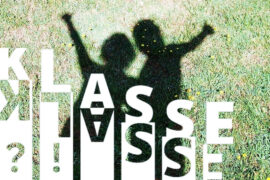Triangle of Sadness illustrates the inequality and injustice that prevails in a capitalist system. Through different parts of the film, attention is drawn to the various power dynamics in society and their absurdity is mocked.
By Alican Albayrak
Picture: via Pixabay, CC0, adaptation: Lisa E. Binder, Svenja Brand
Sometimes, the best way to deal with an absurd or indigestible situation or concept can be comedy. Comedy might serve as a tool to make a problem seem obvious and manageable. It offers an alternative to sorrow, fear and anger as a means for individuals to react and protest against problems like class disparities. By using satirical black comedy, screenwriter and director Ruben Östlund takes the audience on a journey to the absurd living conditions of the elite. In his movie Triangle of Sadness, released in 2022 and awarded with one of the most prestigious awards the Palme d´Or, he conceptualizes the dehumanization and defamiliarization experienced by the working class, accepting and internalizing the weight of systemic oppression. The movie is divided into three parts, centering around a pair of models facing conflicts in diverse settings: a restaurant, on a yacht, and on an island after a shipwreck. It effectively highlights class divisions and societal apathy towards this problem. Östlund invites the audience to critically examine the power structures in society through use of allegories and metaphors.
In the Clouds
The movie consists of two main conceits to represent the symbolic violence experienced by the less privileged under the hegemony of the powerful: the luxury yacht and the island. Particularly, the second part of the movie makes injustice and inequality visible by showing the rigid class system that prevails on the yacht. A large number of working-class people serves in all kinds of absurd ways to a privileged few. There is also a class system among the workers on the yacht; while white people serve as waiters at the top, the Asian cleaning employees and kitchen workers are located downstairs and one more level below, there are Middle-Easterners responsible for maintenance.
As a mirror of the real world, on the yacht, the wealthy elite physically and emotionally controls the working class. A Greek employee is getting fired in a scene due to the protagonist, Carl’s jealousy and complaint, simply because he works half-naked. Also, a wealthy woman insists the crew clean the sails despite there not being any sails on the yacht. In another scene, Vera, a fertilizer supplier, Dimitry´s wife, compels the crew stop working and slide into the ocean, deriving personal pleasure by envisioning herself as a philanthropist. The often-repeated phrase, »in the clouds« by a German character who has a disability of speaking holds significance in this point, as it embodies detachment from reality. These scenes might be humorous but they also depict the elite’s exploitation, oppression, victimization and dominance over underprivileged people in a manner that is both striking and absurd.
Reihe Klasse?!
Was ist das, eine Klasse? Haben wir alle eine? Wie prägen Klassen und Ideen von Klassen unseren Gesellschaften und den Umgang miteinander? Wie stellt man sie dar? Und wie können wir uns dazu verhalten? In dieser Reihe machen sich die Autor:innen Gedanken über gegenwärtige Gesichter von Klasse und Klassismus. Sie entwickeln sie beispielsweise anhand von literarischen Texten oder Sachbüchern, im Theater, als Forschende und persönlich. Die Texte erscheinen in unregelmäßigem Abstand; sie sind hier zu finden.
Indifference to the Class
One of the main reasons that causes such disparities might be indifference to the class struggle. Especially the lower-class people are busy with basic needs and illusionary fulfilments rather than thinking about socioeconomic injustices. Therefore, the wealthy become ideologically, politically and economically stronger. The indifference to social stratification becomes visible during the Captain’s Dinner. Because of a storm outside, the yacht experiences significant motion; people get seasick and throw up, but crew members try to play their roles by putting on a metaphorical mask that conceals their triangle of sadness and acting as if everything is fine and under control. In the same evening, the communist American captain, ignoring his responsibility for the yacht, gets drunk and argues with a capitalist Russian man until the yacht is being attacked by pirates. This scene might be a representation of the money-oriented world’s condition under the hegemony of reckless authorities.
In the last part of the movie, the tables turn. The effects of a system, in which the powerful become more powerful remain unaltered and not only causes inequalities, but is again used entirely for the advantage and well-being of the powerful. After the shipwreck, the toilet cleaning manager, Abigail becomes the most potent individual since she is able to catch fish and make a fire. This is thefirst time the audience learns a lower-class character’s name who was not recognized as an individual before.
On the island, beauty is not a currency anymore. Patriarchy loses its dominance. Social status is trivial. Money becomes vain. Race, culture, identity or familial background hold no value. And this is where the norms of society, particularly those rooted in materialism, are starting to be effectively mocked. Abigail develops a superiority complex and utilizes her hegemony to oppress and subjugate others. Power corrupts. Men are treated unequally; they have to sleep outside. Also, she forces the main character to sleep with her almost every night in return for some snacks. The system perpetuates itself in a new setting. The effects of a system, in which the powerful become more powerful remain unaltered and not only causes inequalities, but is again used entirely for the advantage and well-being of the powerful in a different setting, on an island. Therefore, when the dynamics of power are reversed, the rich of the previous setting become the new victims this time.
Portrayal of Class
Triangle of Sadness
2022
147 minutes
Direction and screenplay: Ruben Östlund
Cast: Woody Harrelson, Harris Dickinson, Charlbi Dean, Iris Berben, Sunnyi Melles, and others
The movie mainly depicts the class issue with the critique of people who indulge in luxury and enjoy the yacht in abundance while being unaware of less fortunate people who struggle in this metaphoric sea. Despite the fact that the central theme of the movie can be compelling with the catchy scenes, the allegories such as the yacht and the island and metaphors such as the storm and shipwreck might be very simple or obvious, leaving the audience with little to think about. Additionally, even if comedy can be weaponized against class stratification, it might lead to frivolity too when everything in the movie is treated as a joke. Moreover, as the employees are categorized by their class identity, the wealthy people are mostly represented as stupid, ignorant, coward, and unskillful, so they are also stereotyped. Still, the movie can be considered a useful tool as a social satire for picturing the greed in many powerful people which might lead to a plight or catastrophe.
Triangle of Sadness aims to draw attention to the devaluation of individuals with poor socio-economic status and identifying them with group identity rather than individual. It also illustrates the normalization of the absurd lifestyles of individuals with high social and economic status who indulge in luxury yachts, private jets going to the global warming conferences or thousands of dollars costing submarines tripping to the deep of the Atlantic Ocean just to see the wreck of Titanic. This sharp contrast between the lives of the privileged and the struggles of the underprivileged underlines the injustice that reigns in society. However, as a reaction to the current power dynamics, Triangle of Sadness depicts how fast positions in an exploitative hierarchical system can be reassigned. Besides, through different parts and scenes of the movie, Östlund points out the perpetuation of the power structures in different settings when individuals obey the hierarchy and social stratification without questioning and by being busy with their roles in the existing state. In every setting, the ones who hold the power might also get the potential to take advantage of others. As a satirical black comedy, the movie successfully depicts the consequences of the extravagant lifestyles of the wealthy elite and systemic discrimination against the less privileged by providing a relaxation to the audience’s triangle of sadness.






